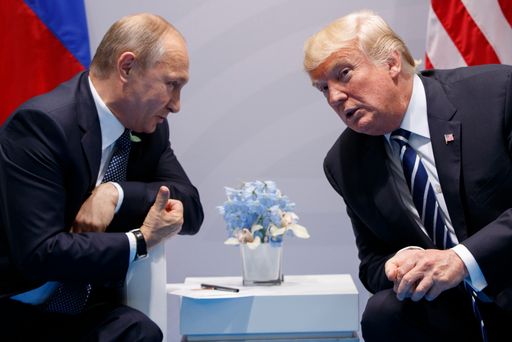US President Donald Trump said he would seek a three-way meeting with Volodymyr Zelenskyy and Vladimir Putin immediately after his Alaska summit with the Russian leader aimed at ending the three-year war in Ukraine.
Trump spoke on Wednesday after what he described as a "very good" call with European leaders, including Zelenskyy — even as Russian forces made their biggest advance into the Ukrainian president's country in more than a year.
"If the first one goes okay, we'll have a quick second one," Trump told reporters as he was questioned about the face-to-face in the Alaskan city of Anchorage with his Russian counterpart, set for Friday.
"I would like to do it almost immediately, and we'll have a quick second meeting between President Putin, President Zelenskyy and myself, if they'd like to have me there."
The high-stakes summit comes with Trump struggling to broker an end to the conflict, and Zelenskyy and his European allies earlier urged the Republican to push for a ceasefire.
The stepped-up Russian offensive, and the fact that Zelenskyy has not been invited to Anchorage, have heightened fears that Trump and Putin could strike a deal that forces painful concessions from Ukraine.
The US leader promised dozens of times during his 2024 election campaign to end the conflict on his first day in office, but has made scant progress towards securing a peace deal.
He threatened "secondary sanctions" on Russia's trading partners over its invasion of Ukraine, but his deadline for action came and went last week with no measures announced.

'Severe consequences'
Trump warned on Wednesday that he would take a follow-up meeting off the table if he felt Putin was acting in bad faith.
"There may be no second meeting because, if I feel that it's not appropriate to have it because I didn't get the answers that we have to have, then we are not going to have a second meeting," Trump said.
As the war rages on in eastern Ukraine, Zelenskyy flew to Berlin and joined Chancellor Friedrich Merz on an online call with other European leaders and the NATO and European Union chiefs, in which they talked to Trump and urged a united stance against Russia.
The consensus was for Trump to secure a ceasefire, and Trump said Russia would face "severe consequences" if it didn't halt its offensive.
But Zelenskyy also voiced doubt about Moscow's intentions, saying: "I have told my colleagues — the US president and our European friends — that Putin definitely does not want peace."
Trump on Monday played down the possibility of a breakthrough in Alaska but said he expected "constructive conversations" with Putin.
"This is really a feel-out meeting a little bit," Trump said. But he added that eventually "there'll be some swapping, there'll be some changes in land".
Merz said Ukraine is ready to negotiate "on territorial issues" but stressed that legal recognition of Russian occupations "would not be up for debate".
After the call, European Commission President Ursula von der Leyen said that Europe, the United States, and NATO had "strengthened the common ground for Ukraine," while NATO head Mark Rutte declared: "The ball is now in Putin's court."
The Russian Foreign Ministry had earlier branded the frantic round of diplomacy "politically and practically insignificant" and an attempt at "sabotaging" US and Russian efforts to end the conflict.



















